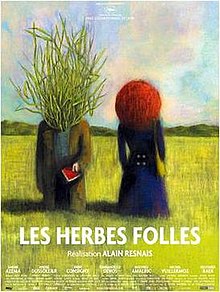Les Herbes folles
| Wild Grass | |
|---|---|

Film poster
|
|
| Directed by | Alain Resnais |
| Produced by |
Jean-Louis Livi Julie Salvador |
| Written by |
Alex Reval Laurent Herbiet |
| Story by | Christian Gailly |
| Starring |
Sabine Azéma André Dussollier Anne Consigny Emmanuelle Devos |
| Narrated by | Édouard Baer |
| Music by | Mark Snow |
| Cinematography | Éric Gautier |
| Edited by | Hervé de Luze |
| Distributed by | Studio Canal |
|
Release date
|
|
|
Running time
|
104 minutes |
| Country | France |
| Language | French |
| Budget | €11 million |
| Box office | $7.7 million |
Wild Grass (French: Les Herbes folles) is a 2009 French film directed by Alain Resnais. The film competed in the main competition at the 62nd Cannes Film Festival.
After working with the producer Bruno Pésery on his previous four films, Alain Resnais took up an invitation from Jean-Louis Livi to make a new one. For a subject, he was drawn to the novels of Christian Gailly by the author's "ironic and melancholy voice", and also by the musical quality of his writing and dialogue. He settled upon L'Incident, and obtained Gailly's permission to adapt it for the cinema when he undertook not to require Gailly's involvement in the preparation of the script. Although Resnais had worked closely with novelists on some earlier projects, this was the first time in his career that he took an existing novel as the basis for a film.
Marguerite Muir is a dentist, single and middle-aged, independent and unpredictable of mood. Georges Palet is in his late 50s, married, and unemployed; he too is temperamental, and burdened by something in his past (unexplained but possibly criminal). When Georges discovers the discarded wallet from Marguerite's stolen handbag and hands it in to the police station, he allows himself to imagine the door opening to a romantic encounter. Marguerite initially has other ideas, but is later drawn towards Georges. Georges's wife Suzanne, Marguerite's best friend Josépha and two policemen are drawn into the entanglement of their lives. Georges and Marguerite share a passion for aviation, which leads to a flight with Suzanne in Marguerite's plane, while a farmer watches apprehensively from below. There is an uncertain resolution of their adventure, and the film ends with an enigmatic question from the farmer's daughter.
In preparing the script, Resnais used the dialogue from Gailly's novel, since this had been the element which had particularly attracted him initially, and he repeatedly made reference back to Gailly's style of writing when seeking a rhythm for the film narrative or a visual equivalence for the hesitations and contradictions within his sentences. He also encouraged his set designer Jacques Saulnier and his director of photography Éric Gautier to follow the spirit of Gailly in the way that they used bold and contrasted elements of colour in the film's visual design. The composer of the music Mark Snow provided similarly varied and clear-cut musical styles for different episodes.
...
Wikipedia
